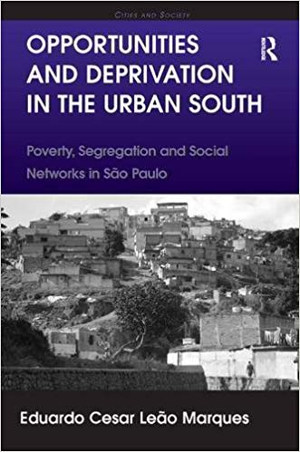Released on May the book by Eduardo Marques, Opportunities and Deprivation in the Urban South. Poverty, Segregation and Social Networks in São Paulo, Ashgate, 198 p., is based on his livre-docência thesis (lauched in Brazil in September, 2010 by Unesp Publisher and entitled Redes Sociais, Segregação e Pobreza). Contending that everyday sociability and social networks are central elements to an understanding of urban poverty, Opportunities and Deprivation in the Urban South draws on detailed research conducted in S�o Paulo in an examination of the social networks of individuals who identify as poor. The book uses a multi-methods approach not only to test the importance of networks, but also to disentangle the effects of networks and segregation and to specify the relational and spatial mechanisms associated with the production of poverty. It thus explores the different types of network that exist amongst the metropolitan poor, the conditions that shape and influence them, their consequences for the production of poverty and the mechanisms through which networks influence daily living conditions.
International releases
New books are being released internationally by researchers at the Center for Metropolitan Studies in early 2012, addressing the most recent research production accomplished in the institution. Das politische System Brasiliens brings chapters by Marta Arretche, Fernando Limongi and Argelina Cheibub Figueiredo. El horizonte de la política. Brasil y la agenda contemporánea de investigación en el debate internacional, organized by Adrián Gurza Lavalle has been released recently in México. And in May it will become part of the catalog of the United Kingdom publisher Opportunities and Deprivation in the Urban South. Poverty, Segregation and Social Networks in São Paulo, by Eduardo C. L. Marques.


The scientific director of CEM, Marta Arretche, and the fellow researchers Fernando Limongi and Argelina Cheibub Figueiredo, participate of the book launched in Germany about the Brazilian political system. The book Das politische System Brasiliens (The Brazilian political system), by Dana de la Fontaine and Thomas Stehnken (editor), VS VERLAG, 434 pages, provides an introduction to politics, economics and society in Brazil, addressing their central political institutions, actors and public policy. It also presents specific inquiries on the development of democratic institutions since the end of military dictatorship in 1985 up to the return to democracy. Each chapter also includes a significant initial assessment of the Lula da Silva government, in its many aspects. The chapters of Fernando Limongi and Argelina Cheibub Figueiredo are part of the publication: Politische Institutionen und Performanz der Exekutive in der brasilianischen Demokratie (Political Institutions and performance of executive power in Brazilian democracy) and by Marta Arretche, F�deralismus in Brasilien (Federalism in Brazil).

Released in Mexico in 2011, El horizonte de la política. Brasil y la agenda contemporánea de investigación en el debate internacional, was organized by Adri�n Gurza Lavalle, CIESAS, 2011, 382 p. The publication focuses on policy issues. More specifically, it makes an account of the new research agenda on public policies as a way to expand the understanding of its political and sociologic al causes and consequences. The book condenses the results of several years of reflection and research in CEM and Cebrap and has chapters by several CEM leading researchers. Is brings also chapters by other researchers whom are or had been part of CEM's team: Argelina Cheibub Figueiredo and Fernando Limongi (Qué instituciones políticas cuentan y para qué. Lecciones de los estudios legislativos en Brasil); Marta Arretche, Daniel Vazquez e Sandra Gomes (Descentralización y autonomía. Desplazando los términos del debate); Eduardo Marques, Renata Bichir, Sandra Gomes, Renata Gonçalvez e Thais Pavez (Los desafios de la metrópoli. Desigualdades sociales, políticas públicas y segregación); Adrián Gurza Lavalle, Peter P. Houtzager e Graziella Castello (La construcción política de las sociedades civiles); Vera Schattan P. Coelho e Arilson Favareto (Conexiones entre participación, democracia y desarrollo. Investigación de los impactos políticos y distributivos de la participación social).







